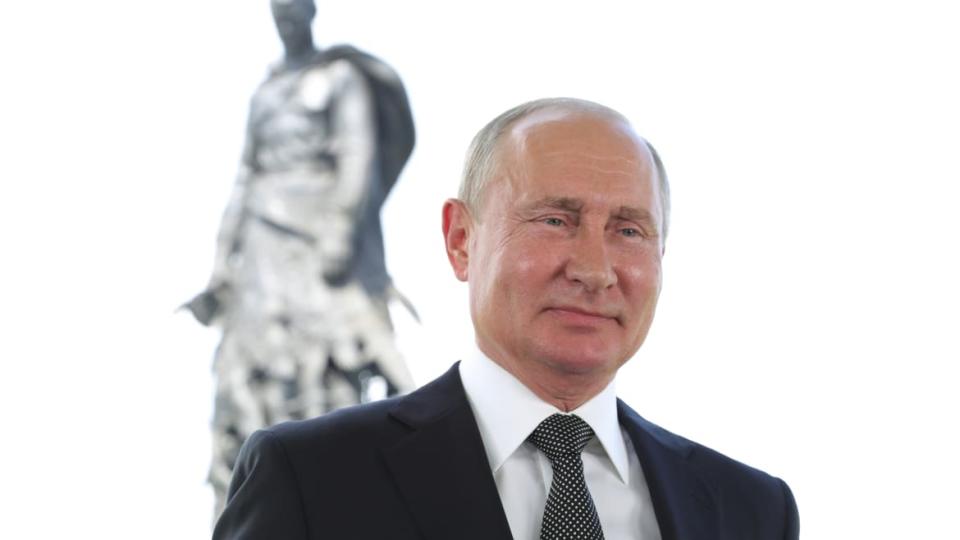Russia Plunges Into Era of ‘Dictatorship’ as Putin Looms Over Eastern Europe

MOSCOW—The day began with a dystopian wave of pre-emptive arrests. Many of his opponents were already under lock and key by the time President Vladimir Putin used an annual state of the nation address to remind people what happens to popular uprisings within striking distance of the Kremlin.
With Russian troops massed on the border of Ukraine in numbers not seen since the invasion of Crimea, Putin gloried in the fate of the pro-Western movement in Kyiv, seven years after he annexed a chunk of its territory.
Similar forces were at play in Belarus, Putin said, where the CIA was accused of stirring up a coup plot against the pro-Russian leader, who rigged elections last year. Putin has helped President Alexander Lukashenko crack down on the protest movement that arose against the blatantly stolen election.
Domestic protesters were gathering across Russia as he spoke, fully aware that a similar crackdown is underway here as Putin’s rule slips toward dictatorship.
The president will meet Lukashenko on Thursday amid increasingly close military and political ties between Moscow and the former Soviet client state. Putin has long wanted to place a missile base in Belarus and would love to further integrate the countries, putting the former Soviet port of Kaliningrad within reach.
In an apparent slip of the tongue, Putin evoked the Cold War era by referring to his Eastern European allies as being members of the “Warsaw… [Pact]” before catching himself.
In the major set-piece speech, Putin claimed that while the West was supposedly stirring up insurrection in the region, “Nobody thought of Ukraine’s fate and does not think of consequences for Belarusians.”
He warned that any further interference in Eastern Europe would be a “red line” for Russia. “The organizers of any provocations against Russia will regret [it] in a way they never have before,” he said, promising asymmetric warfare while an estimated 100,000 troops, tanks, and fighter jets wait on Ukraine’s border.
The recriminations against uprisings within Russia have already begun. Alexei Navalny, the leader of Russia’s opposition, was targeted in a nerve-agent attack last year and then jailed on trumped-up charges earlier this year.
Watch: Russia arrests over 1,000 at Navalny rallies
While Navalny’s supporters were being snatched out of taxis or arrested in their homes ahead of protests Wednesday, he was languishing in a prison hospital in a Siberia penal colony. Doctors say his life is “hanging by a thread.”
After Navalny became ill during a hunger strike and denied access to independent medical professionals, his team called for a nationwide protest. Police stormed the apartments of Navalny supporters on Tuesday and Wednesday, hours before the rally, arresting people in the streets and at work in Krasnodar, Kurgan, St. Petersburg, Yekaterinburg, and many other cities.
Many are reluctant to join the protest because they fear lengthy prison terms, not just the short administrative detentions of up to 15 days, which have been commonplace throughout the Putin era.
And yet, tens of thousands are taking to the streets in what they see as the final battle in Putin’s transformation into a dictator.
One of those protesting is Navalny’s close friend Yevgeny Roizman, the former governor of the Sverdkovsk region. He led several thousand people on a march through Yekaterinburg, despite road closures and police vehicles equipped with water cannons.
Roizman told The Daily Beast on Wednesday that several years in prison was an unpleasant thought for a 58-year-old, but he was unwavering in his determination. “This is a philosophical question for every Russian: Either you live for the rest of your life as a slave and coward, or you come out to feel yourself a free and brave man,” he said.
Since the imprisonment of Navalny—which Amnesty International has described as a slow-motion execution—experienced Kremlinologists, opposition politicians, and journalists have begun to openly describe a hard shift in domestic politics, a path toward “dictatorship,” not the so-called soft authoritarian model sometimes ascribed to Russia.
Moscow politician Vladimir Ryzhkov told The Daily Beast that the country has changed since Navalny’s arrest at the airport as he returned from Germany three months ago.
“Russia is a dictatorship now, where young people, university students get prison terms for innocent posts on social media,” he said. “It will be even worse. Decline of the economy, capital outflow, shrinking incomes, technological lag—these are the inevitable consequences of Vladimir Putin’s domestic and foreign policies.”
Watch: Putin warns foreign powers against crossing Russia’s ‘red lines’
After speaking to The Daily Beast, Ryzhkov was one of hundreds arrested for supposedly organizing Wednesday’s rallies after he reposted details on social media.
Professors and students have been deeply traumatized by police persecutions against the authors of the university newspaper Doxa this month. Four of the young journalists have been arrested and others are being questioned—the crackdown on a student paper is seen as a new low in media suppression even under Putin.
“Police broke the door to our apartment, arrested my friend for her call not to be afraid of exercising our constitutional right of peaceful assembly,” a witness told The Daily Beast. “Many want to leave the country but the courage of Doxa authors, who continue to publish in spite of their friends being under arrest, inspires all the paper’s readers.”
Gennady Gudkov, a Russian opposition figure in exile, insisted that this dark new era would never snuff out all opposition to Putin. “This is not the end of the resistance in Russia,” he told The Daily Beast. “When Putin turns into a dictator supported by military forces, the opposition will radicalize and work from the underground.”
On Wednesday morning, Navalny’s wife, Yulia, posted an Instagram video of herself with the caption: “I am the queen of the underground.”
Get our top stories in your inbox every day. Sign up now!
Daily Beast Membership: Beast Inside goes deeper on the stories that matter to you. Learn more.

 Yahoo Finance
Yahoo Finance 